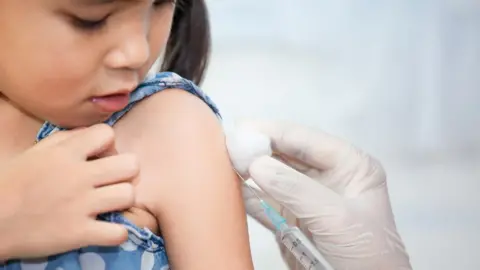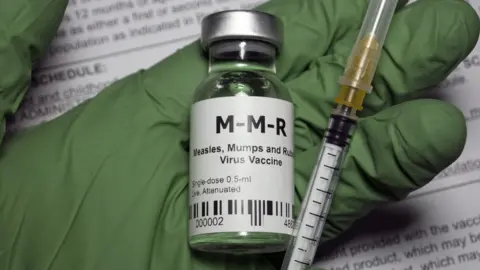Vaccine reminder system 'inconsistent', report concludes
 Getty Images
Getty ImagesThe NHS system for reminding parents to have their children vaccinated is "inconsistent" and making an appointment can be difficult, says a report on vaccine uptake in England.
It says there should be a greater push to identify vulnerable and underserved groups, like travellers.
Since 2012-13, there has been a fall in uptake of nearly all pre-school vaccinations, such as MMR.
NHS England says it is bringing health professionals together to take action.
The National Audit Office has investigated the reasons why increasing numbers of children are missing out on getting seven vaccinations before they start school in England.
Although the government target is for 95% uptake, in 2018-19 only 86.4% received the second dose of the MMR (measles, mumps and rubella) vaccine by age five and 84.8% the four-in-one pre-school booster.
Six out of seven of the pre-school jabs did not meet the target, which is required to keep diseases at bay.
And earlier this year, the UK lost is measles-free status after cases of the potentially deadly illness began to circulate in some communities.
'No coherent system'
The report found there were issues with "inconsistencies" and "no coherent system" across the country over how parents were contacted and re-contacted about booking vaccine appointments.
It said this followed an NHS England reorganisation of the system in 2013, which led to GP practices managing the system in some areas and other providers in other areas.
 Getty Images
Getty ImagesThe report said there was also no consistent national approach by NHS England and Public Health England to engage with "under-served" groups, such as travellers, recent migrants and some religious faith groups.
The percentages of vaccinated children within these groups are often lower than average.
Practical steps can be taken by the government to improve the situation, said NAO report author Ashley McDougall.
"These include sending out proper invitations to parents and re-inviting them when needed, as well as allowing parents to book convenient appointments with their families," he said.
Low London rates
There are wide variations in the uptake of vaccinations in different parts of the country, with London having the lowest levels of uptake.
For example, 96.4% of children in County Durham get the second MMR dose compared with 64.1% in Westminster.
And 97.5% have the Hib/MenC jab in Country Durham compared with 71.2% in Hackney and City of London.
It is thought that a highly mobile population in the capital could be one factor, and a lack of reliable GP data.
 Getty Images
Getty ImagesBut the report says parents still appeared to have confidence in vaccinations and there was "limited evidence" that anti-vaccination messages had had any major impact on uptake.
NHS England says it is looking at how payments to GPs for vaccinating children could improve uptake rates, particularly for 10 to 11-year-olds as part of a new MMR catch-up programme.
It also says new "primary care networks" - groups of GP surgeries joining up - could mean more convenient evening and weekend appointments for parents.
The prime minister is expected to announce a new strategy on vaccination soon.
'Accurate figures'
Dr Richard Vautrey, BMA GP committee chairman, said practices were doing their best to reach everyone who could be vaccinated.
"However, we need resources for improved information systems, particularly regional databases, so that records and vaccination figures are always accurate."
And he said cuts to health visitors and school nurses meant there were fewer opportunities for positive discussions around the importance of vaccines.
"It's positive that the government, NHS England and Public Health England are beginning to prioritise improving vaccine uptake, and crucially we need better research into why certain groups are still not having their children protected and how best to target them effectively."
Dr Sarah Wollaston, chairwoman of the Health and Social Care Committee, said the decline in vaccination rates in recent years was "worrying".
She said she would be questioning health bodies at a hearing in November on their plans to protect children and their communities by improving the uptake of vaccinations.
